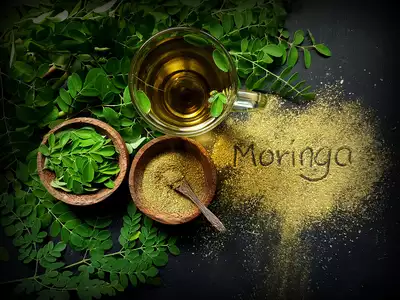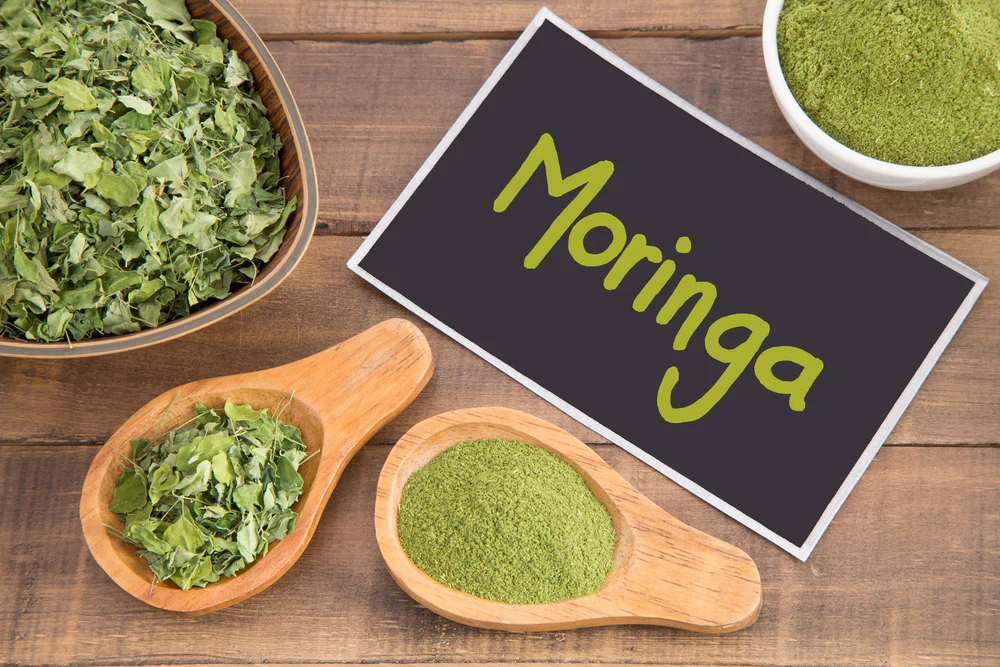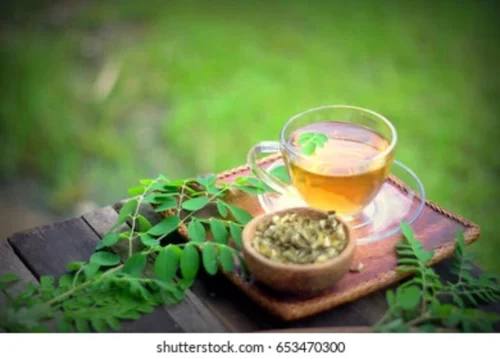Radiant health is a pursuit coveted by many, and in the quest for natural wellness, the spotlight often turns to remarkable superfoods. One such powerhouse of nutrition that has gained significant attention is the Moringa leaf formula. Originating from the Moringa oleifera tree, these leaves pack a punch of essential nutrients, offering an array of health benefits.
Table of Contents
Nutritional Value of Moringa Leaves
Moringa leaves are a nutritional powerhouse, boasting an impressive profile of essential vitamins, minerals, and antioxidants. These leaves are notably rich in vitamin C, known for its immune-boosting properties, aiding in collagen production, and acting as a potent antioxidant that supports skin health and wound healing.
Moreover, Moringa leaves are a great source of vitamin A, crucial for maintaining healthy vision, supporting immune function, and promoting proper organ function. Vitamin E, another component found abundantly in these leaves, acts as a powerful antioxidant, protecting cells from oxidative stress and contributing to heart health.
Delving into B vitamins, Moringa leaves contain a spectrum from B1 (thiamine), which helps convert nutrients into energy, to B2 (riboflavin) and B3 (niacin), essential for metabolism and maintaining healthy skin. The presence of B6 and B9 (folate) is especially beneficial for pregnant women as it supports fetal development and aids in red blood cell formation.
Mineral-wise, Moringa leaves provide a notable source of calcium, crucial for bone health, muscle function, and nerve transmission. Potassium supports heart health and helps regulate blood pressure, while iron plays a pivotal role in oxygen transport and energy production. Magnesium contributes to muscle and nerve function, and phosphorus aids in bone health and energy metabolism.
Antioxidants like quercetin, chlorogenic acid, and beta-carotene present in Moringa leaves combat free radicals, reducing inflammation and potentially lowering the risk of chronic diseases. These antioxidants contribute to overall health by protecting cells from damage and maintaining cellular integrity.
The high nutritional density of Moringa leaves makes them a valuable addition to diets, offering an array of essential nutrients that collectively support various bodily functions, bolster the immune system, and contribute to overall well-being when incorporated into a balanced diet.
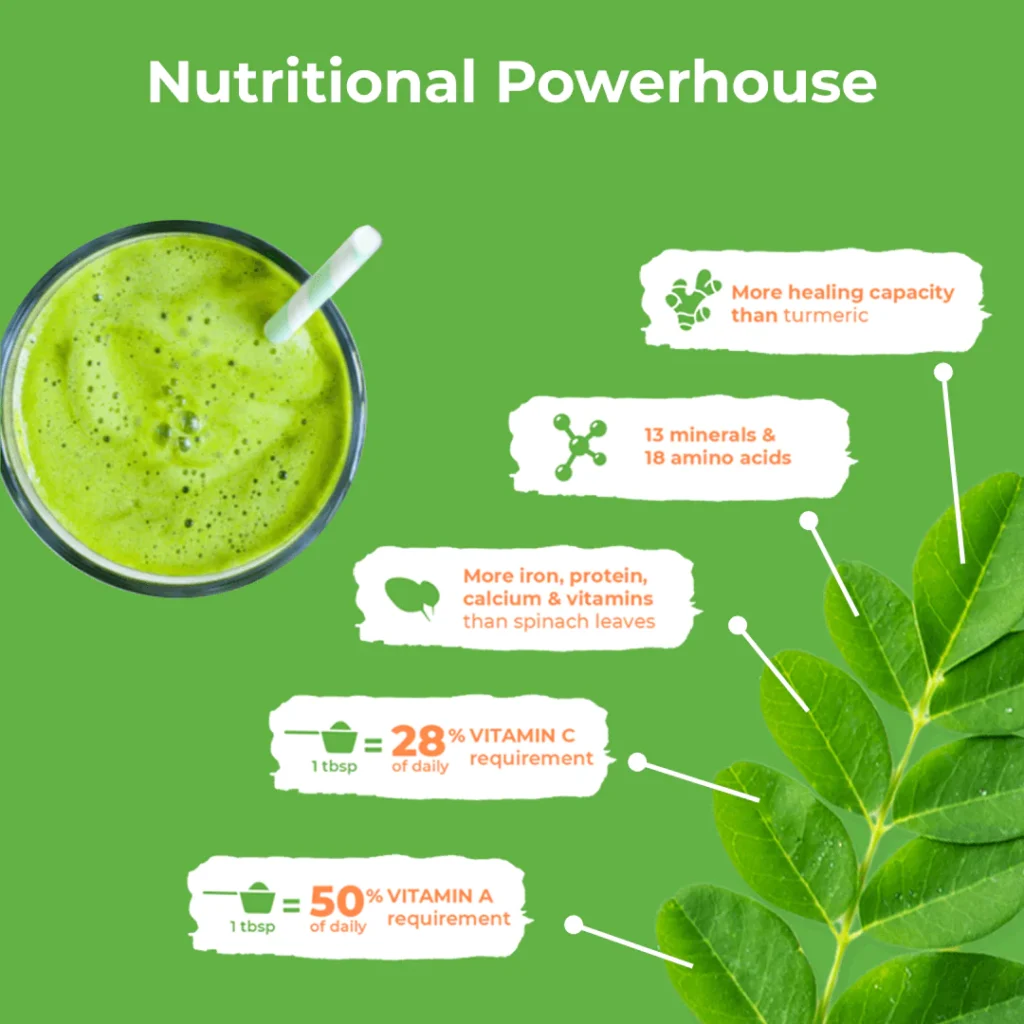
Health Benefits of Moringa Leaf Formula
- Nutrient Powerhouse: Moringa leaf formula is renowned for its rich nutritional profile, packed with essential vitamins, minerals, and antioxidants. It provides a concentrated source of nutrients like vitamin C, vitamin A, calcium, potassium, iron, and antioxidants, offering a potent boost to overall health.
- Boosts Immunity: The high content of vitamins and antioxidants in Moringa leaf formula helps bolster the immune system. These components work synergistically to enhance the body’s defense mechanisms against infections and illnesses.
- Anti-Inflammatory Properties: Compounds present in Moringa leaves possess potent anti-inflammatory properties, aiding in reducing inflammation throughout the body. This property is beneficial in managing various inflammatory conditions.
- Supports Cardiovascular Health: Regular consumption of Moringa leaf formula may contribute to heart health by helping to regulate blood pressure and cholesterol levels. Its antioxidant content also assists in reducing oxidative stress on the cardiovascular system.
- Aids Digestive Health: Moringa leaf formula is believed to have digestive benefits, potentially easing digestive issues and promoting a healthy gut. Its natural compounds may assist in soothing the digestive tract and supporting proper bowel function.
- Enhances Skin and Hair Health: The rich blend of vitamins and antioxidants in Moringa leaf formula can contribute to healthier skin by combating free radicals, promoting collagen production, and supporting skin elasticity. Additionally, it may aid in improving hair health and strength.
- Potential Blood Sugar Regulation: Studies suggest that Moringa leaf formula may help regulate blood sugar levels, making it potentially beneficial for individuals managing diabetes. Its compounds might aid in improving insulin sensitivity.
- Provides Energy Boost: The nutrients in Moringa leaf formula play a role in energy metabolism, potentially providing a natural energy boost. Incorporating it into the diet may help combat fatigue and promote vitality.
- Anti-Aging Properties: Antioxidants present in Moringa leaf formula help fight signs of aging by protecting cells from damage caused by free radicals, contributing to a youthful appearance and overall vitality.
- Supports Bone Health: The presence of calcium, phosphorus, and other minerals in Moringa leaf formula contributes to bone health, aiding in maintaining strong and healthy bones.
Consuming Moringa leaf formula as part of a balanced diet may offer a wide array of health benefits, contributing to overall wellness and vitality. However, it’s advisable to consult with a healthcare professional before incorporating new supplements into one’s routine, especially for individuals with existing health conditions or those on medication.
How to Incorporate Moringa Leaf Formula
- Moringa Tea: Brew Moringa leaves in hot water to create a nourishing and flavorful tea. Steep the leaves for a few minutes, strain, and enjoy. You can add honey or lemon for taste.
- Smoothies or Juices: Blend Moringa leaf powder or fresh leaves into your favorite smoothies or juices. Its mild flavor blends well with fruits like bananas, berries, or mangoes, offering a nutritious boost.
- Salads and Dressings: Sprinkle dried Moringa leaf powder over salads or mix it into salad dressings. It adds a nutritional punch without altering the taste significantly.
- Soups and Stews: Add dried Moringa leaf powder or fresh leaves to soups, stews, or curries during cooking. It infuses these dishes with added nutrients.
- Stir-fries and Sauces: Incorporate Moringa leaf powder into stir-fries or sauces for pasta or rice dishes. It blends seamlessly and adds a nutritional element to your meals.
- Moringa Capsules or Supplements: If incorporating Moringa into meals isn’t convenient, consider taking Moringa leaf supplements or capsules, available in health stores. Follow recommended dosage instructions.
- Moringa Snacks: Create nutritious snacks by mixing Moringa leaf powder into homemade energy bars, granola, or even sprinkle it over popcorn for a healthy twist.
- Moringa-infused Beverages: Experiment with adding Moringa leaf powder to beverages like lemonade, iced tea, or even coconut water for a refreshing and nutritious drink.
- Baking: Incorporate Moringa leaf powder into baked goods such as muffins, pancakes, or bread for an added nutritional boost.
- Moringa Seasoning: Mix Moringa leaf powder with herbs and spices to create a flavorful seasoning for various dishes, enhancing both taste and nutritional value.
Remember, while incorporating Moringa leaf formula into your routine, start with smaller amounts and gradually increase as per your preference and tolerance. It’s essential to purchase high-quality, organic Moringa products and consult with a healthcare professional, especially if you have any allergies or medical conditions, to ensure it’s suitable for your health needs.

Sourcing and Quality of Moringa Leaves
- Organic Certification: Opt for Moringa leaves that are certified organic. This certification ensures that the leaves are cultivated without synthetic pesticides, herbicides, or chemical fertilizers, maintaining their purity and nutritional value.
- Harvesting Practices: Look for Moringa leaves harvested from trees grown in optimal conditions. Leaves picked from healthy, mature trees tend to offer higher nutritional content. Ethical harvesting practices that preserve the tree’s sustainability are also important.
- Processing Methods: Pay attention to how the leaves are processed. Low-temperature drying methods help retain the maximum nutrients. Excessive heat during processing can degrade the nutritional content of the leaves.
- Quality Testing: Reliable suppliers often conduct quality tests for contaminants and heavy metals. Ensure that the product undergoes testing for purity and quality, ensuring it meets safety standards.
- Reputation of Supplier: Choose reputable suppliers or brands with positive reviews and transparent sourcing practices. Trustworthy suppliers often provide information about the source of their Moringa leaves and their cultivation methods.
- Packaging and Storage: Quality packaging that protects the leaves from moisture and light helps maintain their freshness and nutritional integrity. Proper storage conditions, away from direct sunlight and moisture, are crucial for preserving their quality.
- Traceability: Some suppliers offer traceability, allowing consumers to track the origin of the Moringa leaves. This transparency ensures accountability and helps in understanding the product’s journey from cultivation to packaging.
When purchasing Moringa leaves, whether in the form of powder, capsules, or dried leaves, prioritize products that meet these quality criteria. By doing so, you can ensure you’re obtaining high-quality Moringa leaves that retain their nutritional potency, promoting your well-being effectively.
Scientific Studies and Evidence
- Antioxidant Activity: Research indicates that Moringa leaves contain powerful antioxidants like quercetin, chlorogenic acid, and beta-carotene. These compounds help combat oxidative stress, reducing cell damage caused by free radicals. (Reference: “Antioxidant properties of different parts of Moringa oleifera,” Food Chemistry, 2009)
- Anti-Inflammatory Effects: Studies suggest that bioactive compounds in Moringa leaves exhibit anti-inflammatory properties. They may help reduce inflammation markers in the body, potentially aiding in managing inflammatory conditions. (Reference: “Anti-inflammatory effect of Moringa oleifera Lam. seeds on acetic acid-induced acute colitis in rats,” Journal of Medicinal Food, 2013)
- Potential Blood Sugar Regulation: Some research suggests that Moringa leaves may help regulate blood sugar levels. Compounds present in the leaves might have hypoglycemic effects, potentially beneficial for individuals with diabetes. (Reference: “Effect of Moringa oleifera leaf capsules on glycemic control in therapy-naive Type-2 diabetes patients: A randomized placebo-controlled study,” Trials, 2021)
- Antimicrobial Properties: Moringa leaves have exhibited antimicrobial activity against various pathogens. Compounds within these leaves have shown potential in inhibiting the growth of certain bacteria and fungi. (Reference: “Antibacterial activity of Moringa oleifera and Moringa stenopetala methanol and n-hexane seed extracts on bacteria implicated in water borne diseases,” African Journal of Microbiology Research, 2012)
- Nutritional Benefits: Studies confirm the rich nutritional composition of Moringa leaves, highlighting their high content of vitamins, minerals, and amino acids. These nutrients contribute to overall health and well-being. (Reference: “Nutritional characterization of Moringa oleifera leaves,” Journal of Chemistry, 2015)
While these studies showcase promising aspects of Moringa leaves, further research is ongoing to explore additional health benefits and potential applications. It’s essential to consider these findings as part of a broader understanding of Moringa’s potential and consult with healthcare professionals for personalized advice or treatments.
Moringa Leaf Formula in Traditional Medicine
- Ayurveda: In Ayurvedic medicine, Moringa leaves, known as “Shigru,” are valued for their ability to balance the doshas, particularly in managing Vata and Kapha imbalances. They are believed to enhance vitality, improve digestion, and support joint health.
- Siddha Medicine: Moringa leaves, referred to as “Murungai,” hold a significant place in Siddha medicine. They are used to alleviate conditions related to inflammation, respiratory issues, and skin ailments. They are also considered beneficial for promoting overall health and well-being.
- Traditional African Medicine: Various African cultures have incorporated Moringa leaves into their traditional healing practices. The leaves are utilized to treat conditions like malaria, stomach disorders, anemia, and as a general tonic for boosting immunity and vitality.
- Traditional Asian Medicine: In many Asian countries, including the Philippines and Thailand, Moringa leaves have been used traditionally for their anti-inflammatory, antifungal, and antibacterial properties. They are employed to manage skin infections, digestive issues, and as a supplement to support overall health.
- Ethnomedicine: Indigenous communities in different parts of the world have used Moringa leaves as a remedy for various ailments, ranging from wound healing to managing diabetes and hypertension. The leaves are also believed to possess analgesic and antiulcer properties.
The utilization of Moringa leaf formula in traditional medicine systems is rooted in its perceived effectiveness in addressing a spectrum of health issues. Its incorporation into modern wellness practices continues to bridge traditional knowledge with contemporary approaches to health and holistic well-being. However, while these traditional uses suggest potential benefits, scientific research is ongoing to validate and understand the precise mechanisms and efficacy of Moringa in traditional medicine contexts. Consulting healthcare professionals is advisable for tailored guidance regarding the use of Moringa leaves in individual health regimens.
Sustainability and Environmental Impact
- Fast-Growing and Drought-Resistant: Moringa trees are fast-growing and resilient to harsh conditions, thriving in arid or semi-arid climates. They require minimal water compared to other crops, making them an ideal option in regions prone to drought.
- Soil Regeneration: Moringa trees have deep roots that aid in soil retention and prevent erosion. Their cultivation can contribute to soil fertility and regeneration, enhancing the overall health of the land.
- Carbon Sequestration: Moringa trees play a role in sequestering carbon dioxide from the atmosphere. They absorb carbon dioxide during photosynthesis, thereby assisting in mitigating climate change by reducing greenhouse gas levels.
- Multiple Uses from a Single Plant: Virtually all parts of the Moringa tree—leaves, pods, seeds, and even bark—have practical uses. This multifunctionality minimizes waste and maximizes resource utilization.
- Low Environmental Impact: Moringa cultivation typically requires fewer agrochemicals and pesticides compared to many other crops. This reduces the environmental burden associated with chemical use in agriculture.
- Biodiversity Support: Moringa trees can serve as a habitat and food source for various insects, birds, and animals, contributing to local biodiversity.
- Community Benefits: Cultivating Moringa trees can provide economic opportunities for local communities. It offers a sustainable source of income through the sale of leaves, seeds, and other Moringa-based products.
- Promotion of Sustainable Agriculture: The cultivation of Moringa aligns with sustainable agricultural practices, encouraging agroforestry and diversified farming methods.
- Reduced Food Waste: The long shelf life of dried Moringa leaves reduces the likelihood of spoilage, minimizing food waste compared to some perishable crops.
Overall, the cultivation and utilization of Moringa leaves showcase a sustainable and environmentally friendly practice. Its ability to thrive in challenging environmental conditions, minimal resource requirements, and multifaceted benefits contribute positively to ecological conservation and sustainable development.
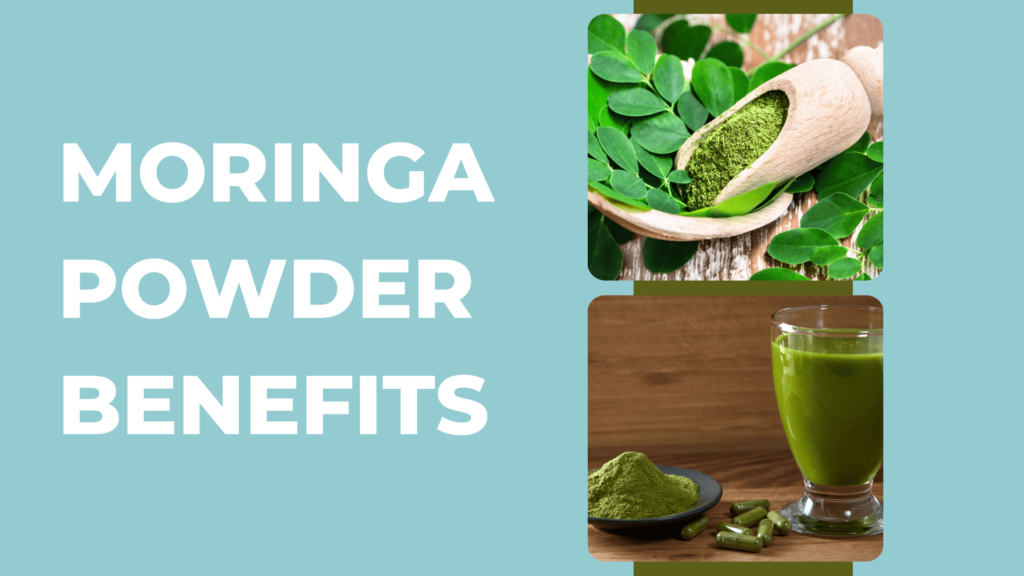
Consumer Testimonials and Reviews
- Energy and Vitality: Many users report feeling increased energy levels and improved vitality after incorporating Moringa leaf formula into their daily routines. They attribute this boost to the rich nutrient content of the leaves.
- Improved Immunity: Consumers often note a strengthening of their immune systems after regularly consuming Moringa leaf formula. They report experiencing fewer illnesses or faster recovery times from common ailments.
- Digestive Health: Some individuals mention improvements in digestion and relief from digestive issues like bloating or discomfort after using Moringa leaf formula. They find it helpful in promoting a healthy gut.
- Skin and Hair Benefits: Several users have observed enhancements in their skin health, such as clearer complexion or reduced acne, attributing these changes to the antioxidant properties of Moringa. Additionally, some note improvements in hair quality and growth.
- Overall Wellness: Consumer reviews often emphasize a general sense of improved well-being. Users report feeling more balanced, with increased focus and mental clarity when consuming Moringa leaf formula regularly.
- Natural Remedy for Ailments: There are anecdotal accounts of Moringa leaf formula assisting in managing specific health conditions like diabetes, high blood pressure, or arthritis. However, individual experiences may vary.
- Taste and Versatility: Some consumers appreciate the mild, earthy taste of Moringa leaves, finding it easy to incorporate into various recipes and beverages without significantly altering the flavor.
It’s important to note that while consumer testimonials provide insights into individual experiences and perceptions, they may vary widely. Personal responses to supplements like Moringa leaf formula can differ due to individual health conditions, lifestyle factors, and dosage variations. As with any health supplement, consulting healthcare professionals for personalized advice is advisable before incorporating it into one’s routine.
Potential Side Effects and Precautions
- Digestive Issues: Some individuals may experience mild digestive discomfort such as nausea, diarrhea, or stomach upset when consuming Moringa leaf formula. Starting with smaller doses and gradually increasing intake may help reduce these effects.
- Allergic Reactions: Allergic reactions to Moringa are rare but possible. Individuals with known allergies to plants in the same family as Moringa (such as cashews) should exercise caution and monitor for any allergic symptoms like itching, swelling, or difficulty breathing.
- Interactions with Medications: Moringa may interact with certain medications. Individuals taking medications for diabetes, high blood pressure, or blood-thinning medications should consult healthcare professionals before using Moringa leaf formula, as it might affect the efficacy or potency of these medications.
- Pregnancy and Breastfeeding: Limited research exists on the safety of Moringa leaf consumption during pregnancy or breastfeeding. It’s advisable for pregnant or nursing women to consult healthcare providers before using Moringa supplements.
- Liver Health: Some studies suggest that high doses of Moringa extracts may have hepatoprotective properties, but excessive consumption might adversely affect liver health. Individuals with liver conditions should use Moringa leaf formula cautiously and under medical supervision.
- Quality and Contamination: Poor quality or contaminated Moringa products might pose health risks. Ensure to purchase Moringa from reputable sources that follow quality standards and conduct necessary safety tests.
- Dosage and Moderation: Adhering to recommended dosage guidelines is crucial. Consuming excessive amounts of Moringa leaf formula can potentially lead to adverse effects, so it’s essential to use it in moderation.
- Sensitive Populations: Children, elderly individuals, and those with compromised immune systems or chronic health conditions should approach Moringa leaf formula cautiously and ideally under the guidance of healthcare professionals.
It’s important to emphasize that while Moringa leaf formula is generally considered safe for most people when consumed in appropriate amounts, individual responses can vary. Consulting healthcare providers before starting any new supplement regimen, especially for individuals with specific health conditions or those taking medications, is crucial to ensure safety and efficacy.
Moringa Leaf Formula in the Market
- Powdered Form: One of the most common forms, Moringa leaf powder, is available in sealed pouches or containers. It offers convenience and versatility, allowing easy incorporation into smoothies, beverages, baked goods, or meals.
- Capsules or Tablets: Moringa leaf extract in capsule or tablet form provides a convenient way to consume a controlled dosage. This format appeals to individuals preferring precise and easy-to-administer supplements.
- Teas and Infusions: Packaged Moringa leaf tea bags or loose leaves allow for a soothing beverage option. Steeping the leaves in hot water produces a nutrient-rich tea with potential health benefits.
- Oil Extracts: Moringa oil extracted from seeds is available as a standalone product. This oil is used in skincare products, hair care treatments, and occasionally in culinary applications due to its nutritional value.
- Ready-to-Drink Beverages: Some markets offer bottled or canned ready-to-drink beverages infused with Moringa leaf extract. These beverages often combine the nutritional benefits of Moringa with other complementary ingredients.
- Supplement Blends: Moringa leaf formula is sometimes incorporated into multivitamin or superfood blends, combining it with other beneficial herbs, vitamins, or minerals for enhanced health benefits.
- Organic and Specialty Stores: Health food stores, organic markets, and specialty wellness retailers commonly stock various Moringa leaf formula products. Online platforms also offer a wide selection for easy accessibility.
- Beauty and Wellness Products: Moringa leaf formula is utilized in skincare and beauty products like creams, lotions, shampoos, and hair masks due to its purported skin and hair benefits.
As consumer awareness of the health benefits of Moringa continues to grow, the availability and diversity of Moringa leaf formula products in the market expand. However, consumers should be discerning, choosing reputable brands or sources that prioritize quality, safety, and ethical sourcing practices when purchasing Moringa leaf formula products.
Future Potential and Research Directions
- Clinical Studies: More rigorous clinical trials are needed to validate the efficacy and safety of Moringa leaf formula for specific health conditions. Research exploring its potential in managing diabetes, hypertension, inflammation, and other ailments could offer valuable insights.
- Bioactive Compounds: Further investigation into the bioactive compounds present in Moringa leaves and their mechanisms of action can provide a deeper understanding of how these components contribute to the observed health benefits.
- Nutritional Applications: Exploring novel ways to incorporate Moringa leaf formula into functional foods, supplements, or pharmaceutical preparations could expand its accessibility and utilization in diverse populations.
- Sustainability Initiatives: Research focusing on optimizing cultivation techniques, enhancing yield, and sustainable harvesting methods for Moringa trees can contribute to environmental conservation and economic development in regions where it’s cultivated.
- Genetic Studies: Studying the genetic diversity of Moringa species may lead to the development of improved varieties with higher nutritional content, better adaptability to various climates, and increased resistance to pests or diseases.
- Industrial Applications: Investigating the use of Moringa leaf formula in various industries, such as agriculture, cosmetics, pharmaceuticals, and water purification, can unveil new commercial applications beyond traditional uses.
- Public Health Initiatives: Implementing educational programs and public health campaigns to raise awareness about the nutritional benefits and sustainable cultivation of Moringa leaf formula can promote its consumption and support local economies.
- Global Health Solutions: Exploring the potential of Moringa as an affordable and accessible nutritional supplement in regions grappling with malnutrition or limited access to essential nutrients could contribute to global health initiatives.
Continued scientific exploration and research into Moringa leaf formula hold significant promise not only for understanding its health benefits but also for leveraging its potential across multiple domains, from nutrition and medicine to sustainable agriculture and environmental conservation. This ongoing research can unlock new opportunities for utilizing Moringa as a valuable resource for human health and well-being while fostering sustainable practices.
Incorporating Moringa Leaf Formula in Daily Life
- Smoothies and Juices: Blend Moringa leaf powder or fresh leaves into your morning smoothies or juices. Combine them with fruits like bananas, berries, or oranges for a nutritious kick-start to your day.
- Teas and Infusions: Brew Moringa leaf tea by steeping dried leaves in hot water. Add honey or lemon for flavor. Enjoy it as a soothing drink in the afternoon or as a caffeine-free alternative to regular tea or coffee.
- Salads and Dressings: Sprinkle Moringa leaf powder over salads or mix it into homemade dressings for added nutrients without altering the taste significantly.
- Soups and Stews: Add dried Moringa leaf powder or fresh leaves to soups, stews, or curries during cooking. It blends well with savory dishes and enhances their nutritional value.
- Stir-fries and Sauces: Incorporate Moringa leaf powder into stir-fries or sauces for pasta or rice dishes. It’s a simple way to infuse your meals with extra nutrients.
- Baking: Mix Moringa leaf powder into baked goods like muffins, pancakes, or bread for a healthy boost. It adds nutritional value without overpowering the taste.
- Snacks: Sprinkle Moringa leaf powder over popcorn, nuts, or homemade energy bars for a nutritious snack. It’s an effortless way to sneak in extra nutrients.
- Supplements: Consider taking Moringa leaf capsules or tablets as a convenient way to ensure a consistent intake of its benefits. Follow recommended dosage instructions.
- Beauty Regimens: Look for skincare or haircare products containing Moringa oil or extract. Incorporating these products into your routine can offer potential skin and hair benefits.
- Educate Yourself: Learn more about Moringa leaf formula and its benefits. Understanding its potential can inspire creative ways to incorporate it into your lifestyle.
By integrating Moringa leaf formula into your daily life through these diverse and simple methods, you can reap its nutritional benefits effortlessly. Experiment with different recipes and find what works best for your taste and lifestyle to enjoy the advantages it offers.
Professional Recommendations and Expert Opinions
- Nutritional Experts: Nutritionists and dietitians often praise Moringa leaf formula for its rich nutrient content. They emphasize its high levels of vitamins, minerals, antioxidants, and amino acids, acknowledging its potential to supplement diets and promote overall health.
- Health Practitioners: Many healthcare professionals recognize the potential benefits of Moringa leaf formula. While they advise caution for individuals with specific health conditions or on medications, they acknowledge its potential role in supporting immunity, combating oxidative stress, and aiding in certain health aspects.
- Research Institutions: Scientific studies conducted by reputable research institutions continue to explore the health benefits of Moringa leaves. These studies aim to validate traditional uses, understand mechanisms of action, and identify potential applications in managing various health conditions.
- Public Health Organizations: Some public health organizations acknowledge the nutritional value of Moringa leaf formula. They highlight its potential role in addressing malnutrition in certain regions and advocate for further research to harness its benefits on a larger scale.
- Holistic Wellness Practitioners: Professionals in holistic wellness often advocate for natural remedies and superfoods like Moringa leaf formula. They suggest its incorporation into a balanced lifestyle to enhance vitality, support immunity, and improve overall well-being.
- Ethnobotanists and Traditional Healers: Experts studying traditional medicinal plants and traditional healers often recognize Moringa’s historical uses. They provide insights into its traditional applications and advocate for its preservation and sustainable utilization.
While professional opinions generally acknowledge the potential benefits of Moringa leaf formula, they also emphasize the importance of individualized approaches to health. Expert recommendations often highlight the need for balanced diets, personalized healthcare advice, and responsible use of supplements, including Moringa leaf formula, to optimize health outcomes. Consulting with healthcare professionals remains crucial for tailored guidance based on individual health needs.
Source to Get Organic Moringa Leaf Powder Capsules
Conclusion
In conclusion, the Moringa leaf formula stands as a nutritional powerhouse with a multitude of health benefits. Its versatile nature, backed by scientific evidence and traditional usage, makes it a valuable addition to one’s wellness routine.
FAQs
- Is Moringa leaf formula suitable for pregnant women?
- Can Moringa leaf formula replace other supplements in my diet?
- What is the recommended daily dosage of Moringa leaf formula?
- Are there any reported allergic reactions to Moringa leaves?
- Can Moringa leaf formula interact with certain medications?
